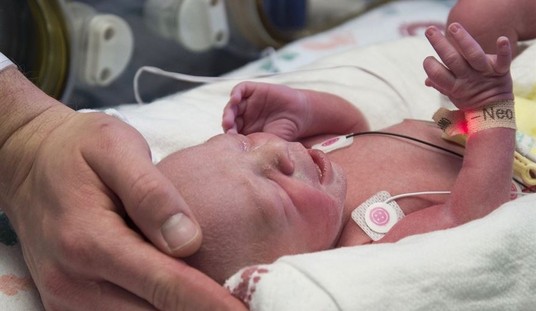In tough economic times, the flimsiness of the environmental movement comes to the fore.
Environmentalism is the luxury of those without more pressing concerns — like survival. In places like China, where their government worries about feeding 1.3 billion people, environmental concerns take a back seat to human concerns like food, water, and jobs.
It was with interest that I followed Robert Scoble’s tweets from China. He reported choking smog and horrendous pollution that was the side effect of making the cheap consumer electronics we Americans used to enjoy buying before the current economic downturn. Scoble also reported that the Chinese are making strides to make environmentally friendly factories.
Environmentally friendly factories are all to the good and not exclusive of human concerns. Without money flowing to buy products, there will be no factories. Environmentally friendly ones will be as out of business as polluting ones.
This begs the question: Does anyone not want to care for the environment? I put the environmental grandstanding in the same category as torture. Who the heck is for torture? No one. And who is for destroying the environment? No one. The question gets murkier when survival is at stake. If a person must choose, and sometimes leaders must choose, between survival and the ideal, sometimes an ethically challenging decision must be made because the higher value is the value of life. More on that in a bit.
The environmental movement depends not only on excessive moralizing and the same sort of mother guilt that keeps therapists everywhere in steady employment, but also suspect data. Just this week, data from NASA which came from Russia turned out to be false. John Hindraker says, “As the scientific evidence continues to accumulate, it becomes increasingly clear that ‘global warming’ hysteria is based on a combination of bad science and fraud.” It turns out that the climate is getting colder.
The Telegraph reports:
The error was so glaring that when it was reported on the two blogs — run by the U.S. meteorologist Anthony Watts and Steve McIntyre, the Canadian computer analyst who won fame for his expert debunking of the notorious “hockey stick” graph — GISS began hastily revising its figures. This only made the confusion worse because, to compensate for the lowered temperatures in Russia, GISS claimed to have discovered a new “hotspot” in the Arctic — in a month when satellite images were showing Arctic sea ice recovering so fast from its summer melt that three weeks ago it was 30 percent more extensive than at the same time last year.
In addition to suspect data, the consumer has been manipulated other ways. For years, the environmentalists have cast driving big vehicles as immoral. In a fit of irony, Democrats work overtime to create a bailout for the very companies they’ve vilified and regulated (to death) for years. Twisted into pretzels trying to keep two key constituents happy — the car industry and the environmentalists — the taxpayer loses. As J. Gillman of MichiganTaxes points out, he’s done his part for the car companies by buying a nice big SUV.
Over the last few months, with record-high gas prices coinciding with an economic downturn, all the talk of windmills and fuel cells sounded good, but what sounded better was cheap fuel. Now. Drill everywhere. Just drill. And save the pie-in-the-sky nonsense for down the road.
The market pressure (high gas prices) did change behavior. People don’t vacation. People don’t travel. People stop buying organic. People don’t go out to eat.
Oh, the irony. High gas prices bring a slowing economy to a screeching halt and reveal the environmental movement for what it is: a punitive, judgmental system that puts “nature” ahead of real, living people.
It costs more to be environmentally sound. Period. It costs at least 25% more to buy organic — something I try to do. As a friend said to me, “That’s a good thing, if you can afford it.” It costs more to retrofit one’s home with energy-efficient windows, heaters, insulation, etc. It costs more to buy hybrid vehicles. It costs more to build energy-efficient factories. It costs more to use fuels that emit less CO2.
Environmentalism is a luxury of the rich, pure and simple, and these same people preaching often live lifestyles that offset their environmentally conscience choices. For all his moralizing, Al Gore has yet to give up private jets or his huge home. And even George W. Bush’s ranch, eco-friendly as it is, is expensive. The average American could not afford to build a home like that if he wanted to.
Believe it or not, gas and oil isn’t the biggest environmental concern that’s bumping up against economic realities. Most of America’s electrical grid is powered by coal and that industry is in the next administration’s crosshairs. Bruce McQuain, my Right Wing News co-blogger and blogger at The QandO Blog, reports:
Coupled with the delay will be the immense cost associated with meeting limits set by the EPA. The power companies have two choices — allow themselves to be bankrupted as promised by Obama in his discussion with the SF Chronicle editorial board, or pass the cost on to the consumer through utility rates.
Of course utility rates normally have to be approved by a government board and government boards, like the Public Service Commission here in GA, are usually not open to $4-a-kilowatt-hour rates, even if that is what it costs a coal-fired plant to produce it under the limits imposed (nuclear is the answer but also unfavored, and the vaporware being pushed as an alternative isn’t anywhere near ready).
So it is decision time for power companies — address the coming deficit with a relatively quickly built but unfavored answer which has the potential to bankrupt them when they try to recover the cost of implementing the “clean” technology or don’t build and let the demand quickly outstrip the supply and allow price to ration the available electricity across an under-supplied grid.
Given the obstacles being imposed by government, I certainly know what my decision would be. And of course, this is precisely the result Obama said his plan would bring.
Barack Obama and many other environmentalists claim to be for the little guy and yet promote policies that will directly harm the little guy. Paying astronomically high electrical costs to cool or heat a person’s home will be far more punitive to the poor and middle class. The rich, as always, will be able to afford to either install more energy-saving technologies or pay the extra freight to supply their energy needs. Plus, they will continue to use more energy to supply their bigger homes.
Americans want to be environmentally friendly and they want to live. That means, if they have to choose, during economically tough times, they’ll choose cheap. Cheap stuff shipped from far, far away. Cheap food bathed in pesticides. Cheap clothes made of synthetic fabrics. Cheap containers made of plastic.
If environmentalists want people worldwide to live in more self-sustaining ways, they will have to make it economically doable. People want to care for the environment, but not at the expense of surviving themselves. Furthermore, it is hypocritical and just plain mean to enact policies that may or may not help the environment but will certainly harm lower- and middle-income families.









Join the conversation as a VIP Member